-
 Art of Wellness Acupuncture & Traditional Chinese Medicine (TCM)11704 Wilshire Blvd, Suite 295, Los Angeles, CA, 90025
Art of Wellness Acupuncture & Traditional Chinese Medicine (TCM)11704 Wilshire Blvd, Suite 295, Los Angeles, CA, 90025
myartofwellness@gmail.com310-451-5522 Office Hours
MonClosedTue7:30 am --4 pmWed7:30 am --4 pmThu7:30 am -- 4 pmFri7:30 am -- 4 pmSat7:30 am -- 4 pmSunClosedOur office opens from Tuesdays to Saturdays 7:30 am to 4 pm, will be closed on Memorial day, Independent day, Labor day, Thanksgiving day, Christmas and New year.
-
Recent Posts
- Chinese New Year 2026: Year of the Horse
- Acupuncture and TCM Treatment for Perimenopause Symptoms
- How to Treat Insulin Resistance With Acupuncture and TCM
- How to Treat Metabolic Syndrome With Acupuncture and TCM
- How to Treat Syncope With Acupuncture and TCM
- How to Treat Thoracic Outlet Syndrome With Acupuncture and TCM
- How to Treat Dupuytren’s Contracture With Acupuncture and TCM
- How to Treat Nutcracker Syndrome With Acupuncture and TCM
- How to Treat Rosacea With Acupuncture and TCM
- How to Treat Perioral Dermatitis With Acupuncture and TCM
- Lymphatic Drainage With Acupuncture and TCM
- How to Treat Turf Toe With Acupuncture
- How to Treat Nerve Pain With Acupuncture and TCM
- How to Treat Watery Eyes With Acupuncture and TCM
- How to Treat Ovarian Cysts With Acupuncture and TCM
- How to Treat Dystonia With Acupuncture and TCM
- Sign up to receive news and updates and get my free report:“The Top 10 Reasons to Try Acupuncture”

December 2025 M T W T F S S 1 2 3 4 5 6 7 8 9 10 11 12 13 14 15 16 17 18 19 20 21 22 23 24 25 26 27 28 29 30 31
Stress & Anxiety
How to Treat Morning Sickness With Acupuncture and TCM
By Xiaomei Cai, L.Ac., Ph.D. & Qineng Tan, L.Ac., Ph.D.

Nausea or vomiting during the first few months of pregnancy, known as “morning sickness,” is experienced by more than half of all pregnant women. Severe nausea and vomiting, or morning sickness that lasts all day or further into pregnancy–called Hyperemesis Gravidarum—is less common, but can cause health problems for both the mother and the developing fetus. Acupuncture and TCM provide a natural and effective alternative for dealing with both mild and severe morning sickness.
“Morning sickness” is somewhat of a misnomer, although nausea during the first several weeks of pregnancy is often experienced early in the day, before eating. Having an empty stomach can exacerbate the queasy feeling of morning sickness. But why is it called morning sickness when it lasts all day? As many women know, morning sickness can strike at any time of day or night, and some women feel nauseous throughout the day.
The majority (at least 70%, maybe more) of all pregnant women experience some nausea during early pregnancy. Morning sickness usually begins occurring when a woman is around 6 weeks pregnant, and goes away by about the 12th week of pregnancy, or the transition into the second trimester. However, some women will continue to feel morning sickness later in pregnancy.
Medical science has not determined exactly what causes morning sickness, although it is generally thought to be related to changes in hormones, particularly an increase in hCG, known as the “pregnancy hormone.” A recent research study found that a specific genetic sequence present in some women may account for increased nausea during pregnancy. Some researchers at Cornell University have posited that morning sickness may be an evolutionary development that prevents harm to babies in utero by keeping the mother’s diet free of potentially toxic substances. They observed that in cultures where the staple diet relies more on starches and less on meat, pregnant women were less likely to experience morning sickness.
For most women, the morning sickness that occurs in the early months of pregnancy is not dangerous to their health or that of the fetus. However, feeling nauseous a lot of time is certainly uncomfortable. Some lifestyle habits can help get the nausea and vomiting under control. Acupuncture treatment and herbs can help even more to provide relief from the daily nausea of morning sickness.
For some women, morning sickness is more than just a nuisance. Not being able to keep any food down and vomiting repeatedly throughout the day for weeks or even months on end can cause serious health issues for mom and baby. Lack of proper nutrition, dehydration, and weight loss can lead to unwanted outcomes later on, including pre-term delivery and low birth weight of the infant. Hyperemesis gravidarum requires treatment. Acupuncture help for morning sickness is a natural alternative to drugs used to treat nausea.
Top 5 Symptoms of Morning Sickness
The symptom of nausea during early pregnancy is often what first lets a woman know she might be pregnant. Feeling queasy, dizzy, sensitive to smells, an aversion to certain foods, and occasionally vomiting are the most common signs of morning sickness. The sensations can be likened to those of motion sickness, or having a hangover. Many women report having a metallic taste in their mouth, and/or more saliva, which can contribute to feeling nauseated.
Severe morning sickness is a more serious problem. Signs of hyperemesis gravidarum include:
- Vomiting 3-4 times per day or more
- Feeling light-headed or dizzy after vomiting
- Dehydration: thirst, dry mouth, not having to urinate normally
- Heart beating fast, heart palpitations
- Losing weight during pregnancy (more than 10 pounds)
Some women may be at higher risk for hyperemesis gravidarum if they are: having multiples (twins or triplets), if their mother also had severe morning sickness (genetics), or if they generally tend to have a more sensitive stomach, even when not pregnant. Stress, lack of sleep, and hot weather can all trigger more nausea during pregnancy.
Medical Treatment for Morning Sickness
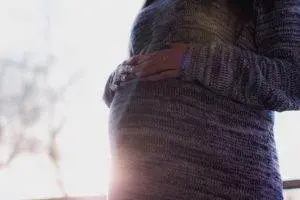
Nausea and vomiting during pregnancy is challenging to treat effectively, as care must be taken to avoid drugs that could harm the mother or the developing fetus. Often women are not treated for severe morning sickness until they have become so sick and dehydrated from vomiting that they need urgent care. At this point, a woman may need to be hospitalized and treated intravenously for dehydration.
There has been a somewhat standard practice of people recommending and using over-the-counter antihistamines or antiemetics like Pepto-Bismol to help quell nausea. In a 6-year study of women with hyperemesis gravidarum, researchers found that women who had used medications like Benadryl during pregnancy were more likely to experience adverse outcomes. A combination of vitamin B-6 and doxylamine is sometimes recommended. This drug combination is sold as an OTC sleep aid. Phenothiazine is sometimes prescribed for women with morning sickness, but it’s efficacy and safety for this use has not been studied extensively.
These medicines are used because they seem relatively risk-free, but they still carry the risk of side effects, like drowsiness, headaches, dry mouth, etc. In many cases, they are not totally effective. Acupuncture and TCM herbal formulations offer relief from nausea and other pregnancy issues without any negative side effects.
How Can Acupuncture Treat Nausea?
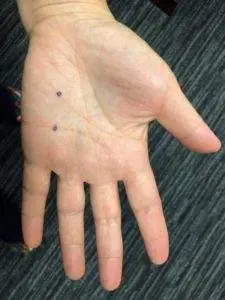
According to TCM, Qi (life force energy) moves through the body along meridians, channels that connect the organ systems. The Chong meridian connects the reproductive organs to the brain and the heart. This particular energy channel is related to all concerns having to do with female reproductive health and gynecological conditions, including menstruation and pregnancy. Its relation to the heart means that it is also connected to feelings of anxiety, panic attacks, and palpitations.
Each woman’s experience of morning sickness is different, so a TCM practitioner will look carefully at each individual patient to determine the specific imbalances causing the nausea and address them appropriately with acupuncture and herbs.
In TCM theory, morning sickness and hyperemesis gravidarum are related to the stomach, spleen, and liver. When a woman becomes pregnant, blood and Qi are strongly directed towards the pelvic area to nourish the womb (uterus) and the developing fetus. This surge of energy will also affect the digestive organs, potentially causing stomach problems. This is more likely to happen to women who have had weak digestion previously, perhaps due to a lack of proper functioning of the spleen. Likewise, the direction of more blood to the reproductive organs can cause a decrease in Yin energy in the Liver, thus increasing Yang energy. Liver fire can also trigger imbalance in the Stomach, leading to nausea and vomiting.
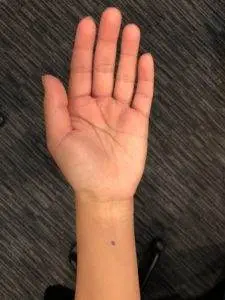
A specific acupressure/acupuncture point on the wrist is especially helpful for reducing nausea. This acupoint is known as PC6, or Nei Guan, 内关, which translates as “Inner Pass.” You may have seen special bracelets or wristbands recommended to help reduce nausea due to morning sickness (or motion sickness or postoperative nausea related to opioid medications). These products are designed to stimulate this acupressure point for nausea. While applying gentle pressure to this point can certainly be beneficial for women experiencing morning sickness, acupuncture treatment that includes this point and others is even more effective.
A systematic review of published studies related to the use of PC6 stimulation for nausea and vomiting found that this treatment produces clinically effective results, not only for pregnant women, but also for patients in cancer treatment and other people experiencing severe nausea.
A randomized trial conducted in Sweden to study the use of acupuncture treatment in conjunction with standard medical treatment for women with hyperemesis gravidarum found that acupuncture was not only very safe and free of side effects, but that women who received acupuncture were able to get over their severe nausea and vomiting more quickly than women getting only the standard treatment.
A study conducted at a maternity hospital in Australia compared women who received acupuncture for morning sickness to groups receiving placebo treatment or no treatment. The women who received acupuncture reported significantly less nausea and retching.
Top 5 Tips to Help Morning Sickness

Naturally, pregnancy is a time to embrace new lifestyle habits that are beneficial to both mother and baby. Eating a healthy diet during pregnancy can be especially difficult if you are feeling nauseous. Getting enough nutrition and rest during pregnancy is vital.
- Eat plain, “bland,” warm foods. Avoid anything that is spicy, salty, fatty, fried, or cold.
- Eat smaller meals/snacks at regular intervals throughout the day, so as to avoid the stomach being empty or too full, and to keep blood sugar levels steady.
- Sip water slowly and regularly. Don’t gulp down large amounts of liquid all at once.
- Sip ginger tea, made by steeping a few slices of fresh ginger.
- Actively prioritize stress reduction. Anxiety can exacerbate the nausea of morning sickness. Take frequent rest breaks. Ask your TCM provider to show you some gentle meditative exercises like Tai Qi or Chi Gong that can help relieve stress and nausea.
Talking with a trusted healthcare professional who understands what you’re going through can be helpful for calming anxieties about your pregnancy. Finding an experienced acupuncturist who can help you through any and all of the symptoms and worries that may come up during pregnancy, birth, and postpartum care can help to ease stress and discomfort.
Acupuncture Near Me for Morning Sickness
Acupuncture is an excellent modality not only for helping to relieve nausea due to morning sickness; TCM is a holistic form of medicine that can help women throughout pregnancy. Many discomforts and concerns may come up as a woman anticipates birth. Working with an integrative health provider who has a thorough understanding of gynecology and obstetrics from both Eastern and Western medical points of view can be beneficial to the physical and emotional health of both mother and baby. At Art of Wellness, we have over 30 years of experience helping women attain better reproductive health: from painful periods, to fertility issues, through pregnancy, postpartum, and menopause.
*This article is for education from the perspective of Traditional Chinese Medicine only. The education provided by this article is not approved by FDA to diagnose, prevent, treat and cure human diseases. It should not stop you from consulting with your physician for your medical conditions. Traditional Chinese Medicine is based on Qi, which is an invisible force that usually cannot be observed by modern science. Because science focuses on testing ideas about the natural world with evidence obtained through observation, these aspects of acupuncture can’t be studied by science. Therefore acupuncture and Chinese herbs are often not supported by double-blind, randomized trials, and they are considered alternative medicine therapies in the United States.
How to Treat Lyme Disease With Acupuncture and TCM
By Xiaomei Cai, L.Ac., Ph.D. & Qineng Tan, L.Ac., Ph.D.
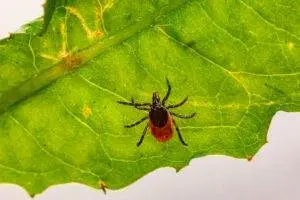
Red, circular rash that looks like a “bulls-eye?” Joint pain, muscle aches, and fatigue? These are signs that a person may have Lyme disease, an infectious disease that humans can contract when they are bitten by an infected tick. Lyme, a bacterial infection, can take a while to develop, and can cause chronic symptoms if it is not treated effectively. Acupuncture and TCM offer an alternative or adjunct way to help resolve the painful, debilitating symptoms of long-term Lyme disease.
Lyme disease is a type of bacterial infection transmitted by ticks. Ticks are parasitic arachnids, small spider-like creatures who bite other animals and feed on blood. If a tick is infected with a disease, it can infect the person or other animal it bites. Lyme disease, which is caused by the Borrelia burgdorferi bacterium, is just one of several infectious diseases that ticks can spread, including Rocky Mountain Spotted Fever (RMSF).
These critters are sometimes called “deer ticks” or “bear ticks” because they generally thrive in forest environments where they live symbiotically with these kinds of animals. But being bit by deer tick (tick on deer) doesn’t only happen in deeply wooded areas; anywhere that deer, squirrels, lizards, or birds may come into suburban areas, it is possible to be bitten by a tick. Actually, ticks, and therefore the infectious diseases they carry, are growing more prevalent because of humans encroaching into animals’ habitats. Tick bites most commonly occur in spring and summer.
Ticks do not fly; they can only get onto dogs or humans by crawling on them. This can happen quite easily if a tick is on a bush or other plant, and a person or dog brushes up against it. Ticks attach themselves to a host, and slowly suck their blood.
Lyme disease in dogs cannot be transmitted to humans, nor is lyme disease contagious, passing from human to human; you can only get Lyme disease by being bitten yourself. In order to pass Lyme disease to a person, a tick generally has to have been attached to that person’s skin for 36 hours or more. Ticks can be as small as the head of a pin, and they burrow in moist, hairy areas of their host’s body, so it is actually quite easy to have a tick on you without knowing it. After the tick drops off, a person may not feel anything at all, or only have a small, red bump that resembles a mild insect bite. In some cases, though, a person may feel right away that the area of the bite is hot, swollen, or causing a burning sensation.
If the tick was carrying Lyme disease, it can take several days to a few weeks for the more serious symptoms of Lyme to develop. Even then, the symptoms are not necessarily distinctive.
The early symptoms of Lyme disease can feel like a flu; fever, fatigue, aches and pains. Not everyone infected with Lyme will have the characteristic tick bullseye rash that develops around the site of the tick bite. When treated promptly with antibiotics, most cases of Lyme disease will resolve within a few weeks. However, many cases of Lyme disease are not diagnosed right away, and if it goes undetected, chronic problems can develop in the ensuing months. Once the bacteria has spread throughout the body, even a long course of antibiotics may not be able to get rid of it. Long-term Lyme symptoms may appear similar to other chronic inflammatory, autoimmune, or neurological conditions, such as fibromyalgia, Bell’s palsy, MS, chronic fatigue syndrome, or PTSD.
In extreme cases Lyme disease causes shoulder pain, hip pain, knee pain, fatigue, and other symptoms so severe that people can’t go about their regular daily routine. Sometimes diagnosis and treatment is further complicated by coinfections: concurrent other infections, that can also have been transmitted via the tick bite, or occur independently of it. Lyme and other tick-borne illnesses like RMSF can also trigger sepsis infections, which can be life-threatening, or lead to chronic pain, and/or PTSD (post-traumatic stress disorder). An MRSA skin infection (Methicillin-resistant Staphylococcus aureus), a type of staph infection that enters the skin through a wound, can develop around the infected tick bite; this staph skin infection is particularly resistant to antibiotics.
Unfortunately, symptoms of Lyme can become progressively worse over time, leading to disability and even death. Acupuncture and TCM offer an alternative for helping to heal Lyme disease, whether it is still in the early stages, or when it has become a chronic infectious disease.
Top 10 Symptoms of Lyme Disease

Signs of Lyme disease develop slowly, in stages, and can vary widely from person to person. Without the presence of the tell-tale bulls’ eye rash, both patients and doctors may have difficulty linking the spectrum of symptoms to a Lyme infection.
- Joint pain, swollen joins, arthritis
- Neuropathy, numbness or tingling, Bell’s palsy (face drooping)
- Fatigue
- Bulls-eye rash, also known as erythema migrans rash
- Headaches, migraines
- Sleep problems, sleep apnea, snoring
- Brain fog
- Trouble breathing
- Vertigo, dizziness
- Blurred vision
Other possible symptoms of Lyme include: ringing in the ears (tinnitus), heart palpitations, problems with memory and concentration, vision problems or inflammation around the eyes, and liver problems, like hepatitis. Symptoms of lyme disease in dogs are similar to those in humans, including stiff, swollen joints, tiredness, and loss of appetite.
Long-term effects of Lyme disease are sometimes referred to as “post-treatment Lyme disease syndrome.” Doctors are not sure why some people, even after being treated with antibiotics, seem to still be affected by long-term effects of Lyme disease.
Medical Diagnosis and Treatment of Lyme Disease
Getting a clear diagnosis of Lyme disease can be difficult. Currently, there is a two-step diagnostic process recommended to determine if a person has contracted Lyme disease. Two main kinds of tests can detect antibodies the body’s immune system creates to fight off the infection. However, it takes a while–at least several weeks, usually–for the body to build up enough of the antibodies that they become detectable. Often when people are aware early on that they may have been infected, and they get a test, it turns out to be negative. Usually, doctors try first one type of antibody test, and then the other to see if they get a positive result. Even then, medical science acknowledges that many (perhaps half of) Lyme disease cases are not detected this way.
A newer, still somewhat unproven form of testing involves taking a blood culture and trying to grow the bacteria that cause Lyme in a laboratory setting. This testing is more advanced and may be difficult for patients to access.
Once physicians have determined that Lyme infection is present, the usual treatment is a course of antibiotics that lasts a few to several weeks. In many cases, this seems to clear up the infection. In others, though, the antibiotics do not resolve the myriad symptoms patients are experiencing. Using antibiotics on a long-term basis is often not effective, and carries other risks to a person’s health.
Ongoing joint pain and inflammation is then usually treated with steroid medications or NSAIDS. Sleep problems and fatigue are often treated with antidepressants. These medications may help relieve symptoms temporarily, but they come with side effects, and do not address the root causes of the chronic symptoms of Lyme disease.
3 Stages of Lyme Disease
When early detection occurs, the Western medical approach of using antibiotics can often resolve Lyme disease within a few to several weeks. However, if the infectious disease is not found soon enough, Lyme disease will progress to more advanced stages. TCM methods can be helpful during all three stages of Lyme.
- First Stage Lyme disease – Within the first few weeks of the infection, and with early detection, antibiotics can be very helpful, working pretty well to stop the spread of the bacteria. However, because Lyme disease is often misdiagnosed, many people do not receive this treatment soon enough. During this phase, the symptoms are similar to those of the flu: chills, fatigue, heaviness in the limbs. As the infection moves in deeper, it can cause the skin rash, or hives. TCM treatment during the first stage will focus on clearing heat and detoxifying the body to rid it of infection.
- Second Stage Lyme disease – If the bacteria causing Lyme disease is not halted in its spread, it begins to affect the organs and the blood. The central nervous system and heart can become infected. These infections can last for months, and if not taken care of, can develop into the third phase. This is when a person may begin to feel joint aches, and arthritis-like symptoms. The body’s Qi and blood become deficient. Treatment with acupuncture and herbs at this point will work to help boost the Qi, clear heat and strengthen the whole immune system, and clear inflammation.
- Advanced stage Lyme disease – As the infection drags on, it can cause joint, skin, and nerve damage can take hold. Ongoing Qi and blood deficiency and stagnation cause fatigue, dizziness, insomnia, and memory loss.
A TCM provider will recognize what stage of Lyme disease a patient is in according to their symptoms, and customize the acupuncture points and herbal formulae used depending on their needs.
Acupuncture for Infectious Diseases

For millennia, TCM has recognized a type of disease that is caused by infection and can affect all systems of the body. We call this type of illness Gu zheng, or “Gu syndrome.” This classification covers illnesses caused by “invisible” pathogens, like viruses, funguses, and parasites. Along with the toxins from the tick bite, we consider how pathogens like heat, wind, and dampness all play a role in the illness. According to TCM theory, extreme heat in the body is also considered “toxic.” This category of condition helps us understand a variety of different systemic inflammatory illnesses, and gives us a framework for addressing each individual’s presenting symptoms.
One of the key features of Gu syndrome illnesses is how terrible and hopeless they can make people feel. Not only do people suffering from chronic inflammatory or immune-related conditions feel constantly tired and ache-y, but some of the sensations seem to come and go and feel so mysterious that they can’t be explained satisfactorily. If this is then compounded with the fact that many doctors don’t understand or know how to deal with the illness, it can leave patients feeling very frustrated and helpless. After months or years of this, debilitating physical symptoms may be accompanied by feelings of depression and anxiety.
A Yale Medical University study of patients, all in their 40s, suffering from long-term Lyme complications found that they had to reduce their activities, or even give up working, and doubted that they would ever recover. In interviews, patients made it clear that working with doctors who were more holistic was far preferred, and thus many had turned to CAM (complementary and alternative medicine) providers for help with Lyme disease.
Making a full recovery from long-term Lyme disease is possible, but it can take a long time to get rid of a bacterial infection that has woven itself deeply into the body’s organ systems. The benefit of Chinese herbal medicine for Lyme is that the powerful substances in the herbs can penetrate deep into the body at a cellular level. Working with an experienced acupuncturist means that your Chinese herbs for Lyme disease can be regularly updated, according to your individual needs, as you progress. This, in combination with acupuncture treatment for Lyme disease, moxibustion, and nutrition guidelines for an anti-inflammatory diet can all help patients feel better faster and prevent any further damage to the organs and the nervous system. Our TCM detox program may also be helpful.
Top 5 Tips for Lyme Disease Self-Care
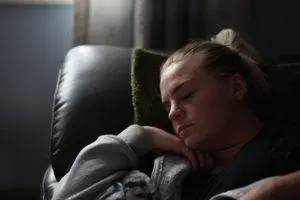
Sometimes re-prioritizing health over all else is necessary in order to heal from a serious infectious disease.
- Conserve energy. Rest as much as possible.
- Drink extra water.
- Eliminate coffee, alcohol, spicy foods, chips, roasted nuts, any food that adds heat and inflames further. Try to reduce heat.
- Eat more cooling foods. Mung bean tea is an ideal choice.
- In the later stages of the disease, we may need to add more strengthening foods, like chicken stock and soup, and will recommend different herbal formulae, as well.
Overall, reducing stress and finding a meditation practice is helpful. For more detailed instructions on how to eat right to reduce inflammation, see our article specifically addressing anti-inflammatory food and lifestyle choices.
Acupuncture Near Me for Lyme Disease
Dealing with a complicated illness like Lyme disease is challenging for people and doctors. A long process of discovery and commitment may be necessary. Working with an experienced TCM provider gives patients the benefits of a multi-pronged, holistic way of addressing multiple symptoms, both physical and emotional. Acupuncture for infectious diseases like Lyme takes into account each patient’s individual concerns, and addresses the complex symptoms of Lyme in concert.
*This article is for education from the perspective of Traditional Chinese Medicine only. The education provided by this article is not approved by FDA to diagnose, prevent, treat and cure human diseases. It should not stop you from consulting with your physician for your medical conditions. Traditional Chinese Medicine is based on Qi, which is an invisible force that usually cannot be observed by modern science. Because science focuses on testing ideas about the natural world with evidence obtained through observation, these aspects of acupuncture can’t be studied by science. Therefore acupuncture and Chinese herbs are often not supported by double-blind, randomized trials, and they are considered alternative medicine therapies in the United States.
How To Treat ED With Acupuncture and TCM
By Qineng Tan, L.Ac., Ph.D. & Xiaomei Cai, L.Ac., Ph.D.
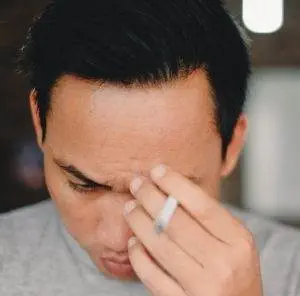
Let’s face it: most men have probably had trouble getting hard on occasion, but if it’s happening 50% of the time, or more often, then it may be a sign of men ED, or erectile dysfunction. ED refers to the inability to get or maintain an erection, making it difficult to have sexual intercourse. Acupuncture and TCM offer a natural solution for low sex drive and reproductive health problems, without over the counter ED pills.
In the past few decades, this condition, which used to be referred to as “impotence,” has come to be perceived as a men’s health issue or a men’s fitness issue that can be treated medically, rather than a personal problem. While it’s great that men can get help from doctors for this condition without embarrassment or shame, ED medications may not solve the problem for everyone. Stress, hormones, nutrition, exercise, emotions, and relationship dynamics all play a role in ED. ED can have a serious impact on a man’s quality of life, as it affects self-esteem, romantic relationships, and sperm count, and fertility.
It is estimated that about 30 million men in the U.S. experience erectile dysfunction (ED). By age 60, over 40% of men will probably experience ED. While ED drugs and over the counter ED pills help some men with ED symptoms, many men cannot use these medications because they interfere with others that are commonly used to treat heart disease. Acupuncture and TCM provide an alternative treatment for ED that can help men with this issue.
Top 10 Causes of ED
ED is a complex problem, which can involve both physical and mental components. A physical problem that causes a man to experience ED a few times may lead to emotional stress around sex and low sex drive, making the problem worse. Because the brain and hormones contribute so vitally to arousal and erection, sometimes depression, anxiety, or interpersonal feelings are the main cause of the issue. Some of the most common physical causes of ED include:
- Heart problems, high blood pressure, clogged arteries, high cholesterol
- Diabetes
- Obesity
- Use of certain prescription medications (antihypertensives, antidepressants)
- Neurological conditions, such as Parkinson’s disease or Multiple Sclerosis
- Alcoholism or excessive consumption of alcohol
- Smoking cigarettes/tobacco
- Prostate problems like BPH (enlarged prostate), or prostate cancer
- Lack of sleep, sleep disorders
- Low testosterone
Sometimes erectile dysfunction is the reason men discover that they have a heart condition or diabetes that they didn’t realize they had. When high cholesterol causes plaque to build up in the blood vessels, it’s not only the heart that is affected. Atherosclerosis (narrowing of the arteries) can also affect a man’s ability to get an erection by restricting blood flow to the penis. Inability to maintain an erection can be a sign that a man has hypertension.
What Is the Treatment for ED?
The most common medical treatment for men with ED are PDE-5 medications (like Viagra, Cialis, or Levitra), which work to dilate the blood vessels that supply blood to the penis. These ED drugs lower the blood pressure, which is why they cannot be used in conjunction with some other medications, including nitroglycerin or Imdur. If a man were to take both his ED pills and these medications, it could cause dangerously low blood pressure.
Some men experience side effects of taking these ED meds, including: headaches, blurred vision, dizziness, hot flushes, muscle pain, and diarrhea. In rare cases, men may have a painful erection that lasts longer than four hours (priapism), which can require medical treatment and/or cause permanent damage. If necessary, a doctor may numb the penis and use a needle to drain the blood that is trapped there, or use decongestant medications to help relieve the swelling. Other forms of therapy for ED include penile implants and penile injections. TCM acupuncture treatment for ED does not involve any needles inserted into the penis itself.
How Can Acupuncture Help ED?

According to TCM theory, ED is classified as a Jin Wei disorder and can follow one of a few patterns:
- Liver qi stagnation
- Blood stasis
- Kidney deficiency
TCM also acknowledges that stress, emotional and mental health disturbances are often a primary cause of ED, and seeks to incorporate counseling and awareness-building, both with the patient, and with the patient’s partner, if applicable. Sessions with a TCM provider usually involve plenty of discussion and feedback; patients feel heard and understood, which can go a long way towards relieving anxiety surrounding the ED or other sexual disorders.
TCM treatment for ED will include both acupuncture and herbs, which, combined, help to address the weakness or blockages that have developed around the liver and kidneys, strengthening the liver qi, relieving stagnation, and clearing dampness.
One study showed that, after a course of treatment including 3-5 acupuncture treatment sessions and daily herbal supplementation, almost half of the men reported satisfaction with the results.
Another study found that about two-thirds of the men who received TCM treatment reported feeling that they were “cure,” while the other third reported improved erections, but still felt that they needed more help. The group who received placebo treatment did not report improvement.
Top 5 Tips for ED Men’s Fitness

The desire to overcome ED and get your sex life back on track can be a great motivation to clean up your diet and get rid of habits you know have been holding you back from peak men’s health. Your acupuncturist can help you plan the best diet for men to help regulate hormones, reduce cholesterol, improve circulation, boost heart health and energy.
- Eliminate alcohol, tobacco, and other recreational drugs. You may feel like these substances help you to relax and get in the mood, but on a deeper physiological level, they are compounding the problem.
- Get more exercise. Ideally, balance cardio with some weight training. Losing fat and building muscle will help to balance the hormones and increase testosterone levels.
- Take care of your mental health and emotional well-being. Foster open and honest communication about ED with your partner. Acquaint yourself with men’s and women’s health issues, so that you can care for each other with empathy.
- Reduce stress. Prioritize a balanced, healthy lifestyle. Making time for yourself through regular exercise, meditation, and healing modalities like acupuncture can help improve your performance in all other areas of your life
- Get adequate sleep. When the body doesn’t get the deep rest it needs, it can lose all kinds of functionality.
Acupuncture Near Me for ED
ED is a sensitive men’s health issue. Knowing that it’s a common problem that affects lots of other men may help a little, but if ED is becoming a sexual problem that is negatively affecting your life and relationships, it’s worth it to seek out help for erectile dysfunction. If conventional medical treatment for ED isn’t working or isn’t an option, or if you want to take a more holistic approach that will help also boost your fertility and longevity, consider acupuncture treatment for ED.
*This article is for education from the perspective of Traditional Chinese Medicine only. The education provided by this article is not approved by FDA to diagnose, prevent, treat and cure human diseases. It should not stop you from consulting with your physician for your medical conditions. Traditional Chinese Medicine is based on Qi, which is an invisible force that usually cannot be observed by modern science. Because science focuses on testing ideas about the natural world with evidence obtained through observation, these aspects of acupuncture can’t be studied by science. Therefore acupuncture and Chinese herbs are often not supported by double-blind, randomized trials, and they are considered alternative medicine therapies in the United States.
How to Treat Hives With Acupuncture and TCM
By Qineng Tan, L.Ac., Ph.D. & Xiaomei Cai, L.Ac., Ph.D.
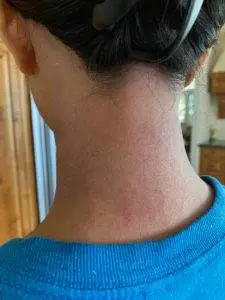
Skin rash with itchy welts or red bumps that seem to appear suddenly, then move to another part of the body, or go away? Hives, also known as urticaria, are caused by a type of allergic reaction that creates a temporary rash or swelling of the skin. TCM and acupuncture have been used for centuries to help relieve hives caused by allergies.
Hives are fairly common, occurring in about 20% of people of all ages. An acute, or short-lived, case of hives may occur because of being exposed to some unusual, new chemical or natural irritant in a person’s environment, maybe in some product, or some pollen or bug. These usually go away quickly, and it may be fairly obvious what it was that caused the outbreak of hives. However, sometimes people develop chronic idiopathic urticaria (CIU), in which a person may break out in hives often on an ongoing basis and have no idea why it keeps happening.
Allergies can manifest in many ways: sometimes causing sneezing, watery eyes, or skin problems. Hives are another way that an allergic reaction can show up. Hives, or urticaria, are distinguishable from other types of skin rash, like dermatitis eczema, or shingles rash, because, unlike other rashes, they do not form fluid-filled bumps or cause dryness, scaliness, or cracking of the skin. Rather, hives are raised welts on the skin that appear red, but then turn white when you press on them; this is known as “blanching.” Hives can look like small, narrow lines, or big, patchy blotches.
Urticaria is related to, and sometimes confused with, angioedema, which is a similar condition, in which deep layers of skin become swollen, often around the eyes and mouth, also due to irritation by some allergen. Angioderma can coexist with hives, and can be more dangerous than hives, if it causes tissues in the throat or tongue to become so swollen that the airway is blocked.
Hives often clear up on their own within a few days or weeks without any treatment. However, some people develop chronic hives, in which the hives rash keeps recurring for weeks or months, or longer. Chronic hives can be a uniquely painful and frustrating condition; never knowing when you might break out into a burning, itchy rash. Hives worse at night or hives worse after sleeping are common experiences for people who suffer from chronic urticaria. Breaking out in hives can make a person feel panic, making it very difficult to get on with daily tasks. Acupuncture treatment can help alleviate the burning and itching of acute hives or chronic hives, and help relieve the allergies, stress, and other underlying conditions that bring them on.

Top 10 Hives Causes or Triggers
In general, what causes hives most of the time is an allergic reaction to some external stimulus. Touching something, eating something, or inhaling something that you are allergic to can cause urticaria to break out on the skin, sometimes briefly, sometimes moving around from one area or the skin to another, or seeming to spread over the skin. Things that can cause hives include:
- Foods, especially those that are well-known allergens like nuts, shellfish, dairy, and eggs, but also fruits, especially citrus fruits
- Contact with certain plants
- Pollen in the environment
- Medications, including antibiotics, OTC pain relievers
- Latex
- Pet dander
- External stimuli from the climate – sun exposure, heat, cold
- Bacterial infections in the body, like strep throat or a UTI
- Viral infections in the body, like colds, hepatitis or mononucleosis (viral hives)
- Blood transfusions
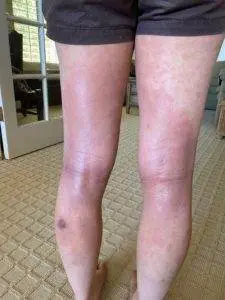
Insect bites or itchy rashes that cause you to scratch at your skin can also cause hives to appear in other areas. Simple pressure on the skin, from sitting or leaning on a patch of skin for a long time, can cause hives. Some people break out in hives when they are under a lot of pressure or emotional stress, even if they are not aware of having allergies or other underlying causes for hives. Sometimes this is called a “stress rash.”
Treatment for Hives
Hives are most commonly treated with antihistamines, which can help relieve itching. Many people experience some type of side effect from taking antihistamines, including: headache, drowsiness, fatigue, and hay fever type symptoms. Some people do get relief from a temporary hives rash after taking Benadryl or something similar. But for others, it may not help, and then doctors often prescribe a corticosteroid as an anti-inflammatory. If steroid treatment for hives does not help, immunosuppressants may be recommended. Depending on the root cause of the hives, these types of pharmacological solutions may or may not work to relieve hives. Acupuncture and TCM treatment focuses on solving the deeper problems that cause hives, without any negative side effects.
How Can Acupuncture Help Hives?

As we have seen, conventional western medicine mostly looks at hives in terms of allergies. But in order to resolve the hives, we have to look more closely at why a person has those allergies. Why are some people affected so strongly by certain foods or certain environmental conditions while other people are not affected at all? We have to consider a person’s constitutional health.
As we have discussed in other articles, in TCM the concept of Wei Qi refers to the body’s protective defenses, the action of which stems mainly from the lungs and the skin. Many types of illness are considered to be related to a weakness or breakdown in the Wei Qi that allows external pathogenic factors to enter the body and take hold. Wind is one such external pathogenic factor. Heat and cold are others. Viral and bacterial infections also find their way into the body when the Wei Qi energy is weakened.
6 Pathogenic Factors According to TCM:
- Wind
- Cold
- Summer Heat
- Dampness
- Dryness
- Fire
Hives come mostly from wind and heat. In TCM, urticaria is known as Feng Zhen Kuai, or “wind rash patch.” Wind describes the nature of urticaria rash in the sense that the hives welts come and go, as if blown about.
When people get hives, it is usually because of one of a few common factors.
- Yin deficiency/Dryness – If the body is too dry, when any allergens get in, there is not enough moisture in the body to wash them out of the system; this causes the breakout.
- Fire/Heat – If there is too much heat, fire, and inflammation in the body, when there is exposure to allergens, the body can’t take any more and will break out.
- Liver stagnation with Heat – When a person is under stress for a long time, it can exacerbate stagnation of Qi in the liver system, which over time causes heat to build up, then the body cannot process little irritations. The liver and kidneys have to do all the work to filter toxins out of the body, but when those organs are overstressed, the body will try to get rid of excess heat through the skin.
Usually, if a person is having chronic hives, it has a lot to do with their food and their habits around their exposure to the elements. For example, in the winter time, in order to be harmonious with the season, the body is meant to experience cold. But many people keep the heater on and keep their environment very warm all the time. This leads to dry air and can cause even people without any allergies to feel itchy. People also tend to take long, hot showers, which can destroy some of the skin’s natural protective layers and cause it to be raw and easily irritated.
In western thought, when a person has a reaction such as hives to certain foods (spicy foods, alcohol), it is thought of as an allergic reaction, but in Chinese medicine we see this as being the body’s reaction to too much heat. If a person already has a fiery constitution, or liver stagnation, and then there are external hot conditions, and hot foods coming in all at once, the internal heat can explode out, creating the burning rash on the skin.
Cupping can be very helpful for treating hives; it exfoliates the skin and helps to draw toxins out. This will help to cool down the hives outbreak. Then we go further with acupuncture and herbs to strengthen the lungs, the liver, and the Wei Qi.
A systematic review of clinical trials studying the use of TCM methods and acupuncture to treat hives, both as an alternative and an adjunct to medication treatment, concluded that acupuncture is a safe and effective way to reduce symptoms of hives or chronic urticaria. Chinese herbs are also well-known for helping to relieve hives.
Top 5 Tips for Hives Relief

How to get rid of hives for good will mean paying attention to what triggers the rash for each individual. To avoid this kind of allergic reaction hives, protect your Wei Qi with healthy habits. Prioritize rest and good nutrition to build up your immunity and protect your lungs and skin.
- Avoid a cold wind blowing on you, whether outside, or from a fan or air conditioner. Dress appropriately; always bring an extra layer so you don’t catch a chill or have a bright sun shining on your skin for a long time when you didn’t expect it.
- Avoid very hot showers, baths, saunas, etc.
- Engage in regular exercise to help boost your blood circulation; walking is always ideal. This will help to reduce stress, as will a meditation practice.
- Get plenty of rest. Good quality sleep is essential to help build up the Wei Qi.
- Avoid foods that are either too hot (spicy or fried, red meats) or too cold (raw foods). No alcohol or coffee. These triggering foods and beverages can really make the hives worse. Drink more water to eliminate the dryness in the body.
If a patient is having trouble figuring out what it is that is causing his or her hives breakouts, a TCM provider may be able to find the underlying reason behind the rash.
Acupuncture Near Me for Hives
People of all ages can receive acupuncture treatment for hives and allergies like hay fever. The doctors at Art of Wellness have been helping people get relief from allergies and itchy skin conditions for over three decades. We can provide help for children with hives with herbs and acupuncture. If you or someone you love is suffering from hives, please consider giving TCM and herbs a try.
*This article is for education from the perspective of Traditional Chinese Medicine only. The education provided by this article is not approved by FDA to diagnose, prevent, treat and cure human diseases. It should not stop you from consulting with your physician for your medical conditions. Traditional Chinese Medicine is based on Qi, which is an invisible force that usually cannot be observed by modern science. Because science focuses on testing ideas about the natural world with evidence obtained through observation, these aspects of acupuncture can’t be studied by science. Therefore acupuncture and Chinese herbs are often not supported by double-blind, randomized trials, and they are considered alternative medicine therapies in the United States.
How to Treat Depression With Acupuncture and TCM
By Qineng Tan, L.Ac, Ph.D. & Xiaomei Cai. L.Ac., Ph.D.

More than ever, people are struggling with feelings of sadness, anxiety, and isolation. Feeling empty or worried all the time, having difficulty concentrating, or even having thoughts of suicide are all possible symptoms of depression. Acupuncture has been shown to be effective for helping manage and overcome both low-grade depression and major depression.
Everyone feels worried, sad, or frustrated due to life situations and problems that come up periodically. But feeling persistently fatigued with heavy emotions for days, weeks, or months on end is a signal that a person might be clinically depressed, or in the throes of a depressive episode.
The current global pandemic is causing most of us to feel exhausted with worry over all kinds of issues: personal health, grief for loved ones who are alone, ill, or have passed, desperation over financial concerns, and feelings of being trapped or deeply pessimistic.
People who already had mental health problems, especially anxiety or depressive disorder, may feel like they have less support than ever, as they cannot see friends or family, and may not have access to meeting with a therapist online. People who have other chronic health conditions, like cancer or chronic pain, may be struggling even more than they normally would, feeling distanced from the care they need.
Everyone is dealing with tremendous stress right now, and we know that stress causes all kinds of health problems. Many people are already used to annual bouts of depression due to Seasonal Affective Disorder (SAD). Young people, most of whom have had to adapt to a wildly different form of learning this year, as well as being cut off from their friends, are even more prone to teen depression. Parents and caregivers are putting in extra hours, and may begin to feel helpless and hopeless in the face of this daily struggle. Truly, everyone is at risk for feeling situational depression in times like these.
Remember that treatment for depression is available, and if you are feeling despondent, it is in your best interest to reach out for help. Integrative care that includes different kinds of therapy may work for people who have not been able to find help for their depressive disorder. We are here at Art of Wellness to provide effective help for depression and chronic anxiety through acupuncture and TCM.
Signs of Depression
Many times people hide or deny their feelings of depression, even from themselves. It is important to recognize the signs and symptoms of depression so that if you or someone close to you if affected, you will be able to get help. Signs that someone is suffering from depression include:
- Changes in weight or appetite
- Changes in sleep habits
- Drug or alcohol abuse
- Difficulty concentrating
- Lack of interest in activities
- Fatigue, feeling tired all the time
- Angry, irritable all the time
- Loss of libido
- Backache, headache, or digestive problems
Signs of depression in teens and depression in women may cause other symptoms, similar to those of anxiety, like racing and intrusive thoughts, extreme sensitivity to criticism, or withdrawal from family and friends. Having trouble sleeping, or sleeping more than usual are potentially signs of depression, as are significant changes in a person’s eating habits, sudden weight loss or weight gain. Depression can also affect cognitive function and memory.
Top 10 Types of Depression

Depression is a mental health condition that is caused by combinations of different factors, and takes many forms in terms of symptoms and behaviors. Mental health professionals differentiate this condition into different types of depression, according to duration, severity, and specific kinds of behavior, emotional, and thought patterns:
-
Major Depression or Clinical Depression – is defined as an episode of sadness or loss of interest or pleasure in external stimuli one usually enjoys that lasts for more than two weeks.
-
Persistent Depressive Disorder or Dysthymia – this is a chronic mental illness characterized by a pessimistic outlook and sad mood that persists for years. In this case, people may have what is sometimes called “high functioning” depression. Even happy occasions do not bring them joy.
-
Manic Depression or Bipolar Disorder – this condition is marked by extreme changes in mood and energy. A person might, at times, feel so low that they have suicidal thoughts or lose touch with reality, then their mood may suddenly shift into high gear, and they seem to have boundless energy and confidence. These shifts may occur over short or long periods of time.
-
Postpartum Depression – colloquially known as the “baby blues,” many women experience a form of depression in the months after having given birth. This type of depression occurs because of sudden changes in hormones, and is often marked not only by fatigue and inexplicable feelings of sadness, but also feelings of anxiety, panic attacks, and disturbing thoughts.
-
Seasonal Affective Disorder (SAD) – this type of depression is relative to the time of year, that is, a person regularly goes through a recurrent period of fatigue and low mood, a sense of heaviness, and irritability, or difficulty getting along with other people. Most people with SAD experience it during the winter months, but it can actually happen at any time of year.
-
Psychotic Depression – this is a form of depression that is accompanied by a break with reality, including delusional or paranoid thoughts, and hallucinations.
-
Premenstrual Dysphoric Disorder (PMDD) – is an extreme form of premenstrual syndrome (PMS) that interferes with daily life during the 7-10 days preceding the period. It is characterized by severe depressed thoughts that can become suicidal in nature. Then, after the period, the symptoms disappear for a few weeks, until the premenstrual phase occurs again.
-
Atypical depression – in contrast to its moniker, this type of depression may be the most common. Atypical depression refers to a predictable pattern of depressive feelings and behaviors, including oversleeping, changes in eating habits, problems with relationships, that overtakes one for a while, then clears up when some kind of positive event occurs. This can turn into a pattern of depression that comes and goes over the years.
-
Situational depression – this type of depression occurs in reaction to some kind of inciting event, maybe one that causes trauma or loss, or simply a major life change like a move or job change. This is a way that some people will adjust to circumstances and stressors in life, and it usually clears up within six months or so after the triggering event.
-
Disruptive Mood Dysregulation Disorder (DMDD) – this is a disorder that occurs in childhood marked by chronic, extreme irritability and a struggle to handle negative emotions. Children with this order may regularly act out or have tantrums when facing frustration.
While some types of depression are considered more severe than others, it is important to keep in mind that all kinds of depression are real health conditions than can and should be addressed before they become even more serious.
Treatment for Depression
In Western medicine, depression is seen mostly as a chemical imbalance affecting hormones and/or neurotransmitters, primarily in the brain. Depression can be triggered by a highly emotional event or difficult circumstances, and then, the chemical imbalance continues to cause negative emotions and disordered thoughts. The conventional medical solution for most forms of depression is a combination of psychotherapy, also known as talk therapy, and prescription medication, in the form of antidepressants or anti-anxiety medications.
Modern psychotherapy aims to help people with depression through the practice of coping skills, problem-solving around relationship issues, and resolving negative emotions.
Different types of antidepressant medication include selective serotonin reuptake inhibitors (SSRIs such as Zoloft, Lexapro, Prozac, Paxil, and Celexa), which affect the way the hormone serotonin is produced and absorbed by the brain cells, and serotonin and norepinephrine reuptake inhibitors (SNRIs like Effexor, Cymbalta, and Pristiq), which influence norepinephrine production, as well. All of these medicines basically work by allowing the brain to have more “good mood” chemicals available. Other, less commonly used medications include second-generation antipsychotics, such as Abilify, which are usually used to treat mental illnesses such as schizophrenia and bipolar disorder, but which are sometimes tried when other medications have not helped.
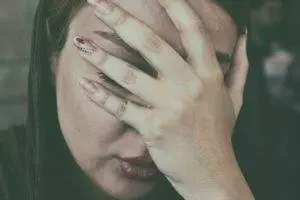
Many people feel that they benefit from the mood stabilisation these medications can provide. Generally, doctors recommend taking the medications for one to two years, to prevent relapses of the depressive symptoms. However, some people find that they have a hard time coming off of certain antidepressant medications, and unfortunately, there are many unpleasant side effects associated with these drugs.
More than half of the people who take antidepressants report side effects such as:
- Headaches
- Dizziness, brain fog
- Weight gain
- Dry mouth
- Restlessness, trouble sleeping, insomnia
- Sexual dysfunction, loss of libido
- Nausea, diarrhea, constipation, or trouble urinating
- Skin rashes or vision problems
In some cases, these side effects may seem manageable in relation to the severe depression they were feeling before, but for others, these problems compound their dissatisfaction with life. More serious side effects, like heart or liver problems can also occur, especially in older people, or because of interactions with other medications used to manage chronic conditions.
Some research studies have shown that acupuncture treatment can be used as an effective alternative to antidepressant medications, or as an adjunct that helps to offset some of the unwanted side effects. This study showed, also, that patients felt an improvement in their mood and quality of life after only a few weeks of acupuncture treatment, whereas the patients taking antidepressants took longer to register the positive effects.
How Acupuncture Treats Depression
TCM takes a holistic view of health that makes it very effective for treating depression. Going back thousands of years, TCM philosophy has always acknowledged the fundamental connection between mental health and physical health. Emotions and thoughts are as integral to wellness as the proper functioning of the organ systems. Imbalances in organs can cause emotional problems, and vice versa. So, when an acupuncture practitioner addresses mental illness such as depression and anxiety, she is looking at the whole picture. While a medical doctor may see varied symptoms such as digestive trouble, headache, irritability, and trouble sleeping as disparate problems to be solved by different specialists, or treated with different medications, a TCM provider views all of these issues as being part of a particular pattern and treats that pattern as a whole.

According to TCM, depression is caused by stagnation, or blockages in the Qi (life force energy). It is usually related to stagnant energy in the liver, spleen, heart or kidneys. Liver Qi stagnation can cause strong feelings of frustration, stomach pain and digestive trouble, heartburn or tightness in the chest, and headaches. Heart or Spleen Deficiency patterns cause worrying, trouble sleeping, and poor appetite. Chronic cases of depression with anxiety are often related to Yin deficiency, which causes irritability, restlessness, poor sleep, and back pain. An acupuncturist looks at all of these symptoms and treats the appropriate pattern with acupuncture and herbs. Acupuncture will also help people by relieving stress, and helping to restore better sleep.
One study looked at patients diagnosed with minor depressive episodes and generalized anxiety. Patients who received ten acupuncture treatments showed significant improvement over those who did not.
A study designed to help show the effect of acupuncture on neural circuity and chemistry as it relates to depression combined acupuncture with antidepressants when treating women with major depressive disorder. The patients receiving both showed improved functional connectivity in the corticostriatal reward circuitry of the brain.
Another study showed that electro-acupuncture treatment has as positive an effect on norepinephrine levels as amitriptyline – a medication commonly prescribed to treat major depression disorder and anxiety disorders.
Can Acupuncture Help Depression During Pregnancy and Postpartum Depression?
Some forms of depression are specific to the area of women’s health. PMDD, pregnancy depression and anxiety, and postpartum depression can all be helped with acupuncture treatment, without the risk of side effects.
It is important, both for their own health and that of the expected baby, that women suffering from depression during pregnancy or in the postpartum period seek help. However, there are risks involved in taking medications during pregnancy. Antidepressant use has been linked to birth outcomes such as low birth weight and premature delivery. Acupuncture, which can provide innumerable benefits during pregnancy, is an option worth exploring to relieve symptoms of depression and anxiety during pregnancy.
Acupuncture Near Me for Depression
Depression can make it difficult to take action. Feelings of hopelessness and isolation can cause people to feel that they are beyond help. Stigma around mental health can cause people to hide their anxiety and extreme moods from others. But depression is a real and treatable illness. Whether you have been struggling with depression for a long time, or have just begun to feel worried about your mental health over the past several months, please do not hesitate to reach out to us at Art of Wellness. We are here to help you get past this depressed period and begin to feel hope and purpose again.
*This article is for education from the perspective of Traditional Chinese Medicine only. The education provided by this article is not approved by FDA to diagnose, prevent, treat and cure human diseases. It should not stop you from consulting with your physician for your medical conditions. Traditional Chinese Medicine is based on Qi, which is an invisible force that usually cannot be observed by modern science. Because science focuses on testing ideas about the natural world with evidence obtained through observation, these aspects of acupuncture can’t be studied by science. Therefore acupuncture and Chinese herbs are often not supported by double-blind, randomized trials, and they are considered alternative medicine therapies in the United States.